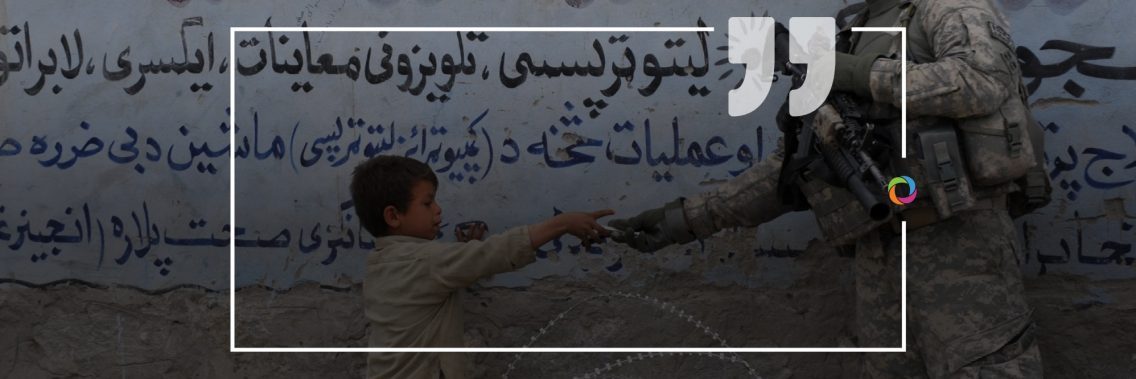The images of thousands of Afghans at the airport desperately trying to flee their country after a hasty US withdrawal sparked an international outcry. Afghans were screaming, begging for help, and children, in a state of shock, looked at their parents with horrified eyes. The drastic change in Afghanistan’s situation is undoubtedly a heavy blow for humanity. Check out some comments from DevelopmentAid international experts.
How do you comment on America’s withdrawal from Afghanistan?

“I suppose the Taliban will take advantage of such an unexpected victory and will not conduct any negotiations with the previous leadership of the country which, in their opinion, has completely discredited itself. The UN and many countries have recognized the Taliban as a terrorist organization. In this situation, the Taliban will need to look for new compromises and mechanisms of mutual understanding with the international community to legitimize their power and form their own government. It will take a very long time. Therefore, there is a very high probability that with the withdrawal of the United States from the country, a strong surge in violence could follow and Afghanistan will face a new bloody civil war.”

“The US intervention in Afghanistan in 2001 was nothing more than a limited war aimed at confronting the Taliban and al-Qaeda and which ended up, over the years, turning into a costly war of choice. However, the definitive exit of the US and the NATO allies from Afghanistan has ended an operation that in two decades has not succeeded in defeating the Taliban or completely eliminating the presence of al-Qaeda. Nor has it built a viable state or put an end to the massive production of drugs in that country. The US cannot simply shirk moral responsibility for the human rights abuse and violence that Afghans are likely to face under Taliban rule and has an obligation to provide refuge for Afghans who are at particular risk because of their support for the US war effort, whether this was or was not unjustified.”

“It’s the logic consequence after starting negotiations without the Afghan Government in Kabul. However, there was no trust in the words and negotiations on either side (the Taliban and Americans) and there was no clear communication and plan about how to leave. The opposition used the momentum. Both parties lost the trust of the Afghans and the international community lost also trust regarding American words and actions. The foreigners cannot fight for the Afghans and their freedom although they can support but not with armies in the country. The fight, if there is a will for one, must be done by everyone.”

“The American withdrawal that was initiated months ago but only finalized over the last week seems to have been reactive more than proactive due to the rapid advance of the Taliban. Although a plan was reportedly in place for the withdrawal, the situation changed rapidly and chaos followed. The current U.S. administration was somewhat bound by the decisions and actions made by the previous administration. However, I believe that the result would have been the same regardless of which administration was in place.”
What is the impact of the Taliban’s return on the international order?

“The return of the Taliban to the international order will have a strong impact primarily on the Islamic world and the countries of the region. Now a more important question has arisen for the international community – the international recognition of the Taliban power in Afghanistan. Today it is already obvious that the US withdrawal from the country has become dangerous not only for Afghanistan but also for the region as a whole. Regional players such as Pakistan, India, China, and Russia began to actively fight to consolidate their strategic interests, increase their influence in this country and the region as a whole. However, as the history of Afghanistan shows, such a development of events does not guarantee the establishment of peace and security either in the country or in the region.”

“The Taliban’s victory in Afghanistan is also a victory for the al-Qaeda terrorist organization. The United States originally invaded Afghanistan to hunt down and destroy al-Qaeda after the group attacked the World Trade Center and the Pentagon on September 11, 2001. Afghanistan had become a haven for terrorists under the Taliban rule. With the return of the Taliban to power, international terrorist organizations could – ahead of schedule – begin operating openly outside the country again as General Mark Milley noted on August 15, 2021. The return of the Taliban to power also poses a great dilemma for states around the world in deciding whether or not to and how to engage with an illegitimate leadership once again. For the EU, this is doubly challenging since all 27 member states have to agree on what their position will be and for what purpose. In the area of development and humanitarian assistance, the big dilemma will also be how to continue supporting the rights and needs of the Afghan population with the Taliban in power.”

“The hardliners will think they can export the Afghan war strategy to other countries. They will need time even it is a decade of terror and in the end, they will win. This will be a real threat for the countries next to Afghanistan and for Russia as well as the EU. The threats and terrorist attacks will increase all over the world and especially in weak Islamic countries.”

“Firstly, the main impact, which started over four years ago, is the loss of credibility and leadership for the U.S. Secondly, the possible return of some safe haven for international terrorist organisations and, thirdly, with the departure of the U.S. from the region, a struggle between regional powers for dominancy.”

“In the very short term, when all foreign forces abandon Afghanistan to its fate, the Taliban are likely to resort to a violent show of force to consolidate their power over all resisting factions. For the longer term, their return to power could present a more insidious security threat to the region and the world at large than the previous 9/11 events if they provide a haven for new Jihadi terrorist and insurgent movements. The Taliban’s future will be predicated on their willingness to contain and restrict terrorist activities throughout their territory. Having witnessed the futile results of the barbaric policies and atrocious methods utilized by the Islamic State (IS) that ultimately led to its demise, the Taliban’s main goal will be to protect its sovereignty. Such protection will prompt them, this time around, to apply a strategy that will be more amenable to and sanctioned by the international order. The Taliban will continue to use their harsh tactics of violating human rights and abusing and degrading women and freedom of expression to the degree that would not arouse global condemnation triggering retaliation. Short of an imminent threat to international security, regrettably, the principles of “Realpolitik” and Western malaise will prevent the world community from interfering in any of Afghanistan’s internal affairs no matter how morally indignant they are.”
Could the Taliban’s return mean a worse security threat than pre-9/11?

“The Taliban are stronger today than they have ever been, thanks to the large number of weapons they have seized. Today, the international community has only two choices: either cooperate with the Taliban-led government or cede all influence in the country to an extremist group that has abused children and women and harbored Osama bin Laden when he planned attacks on the United States. Incidentally, the Taliban seized power in Afghanistan less than a month before the 20th anniversary of the September 11, 2001, terrorist attack. Many international experts agree that the Taliban will do their utmost to support the restoration of various terrorist groups. In this sense, the Taliban power will pose a more serious threat to security in the region and the world, and may become more dangerous than ever.”

“Yes, although other terrorist groups did not disappear from Afghanistan during the US intervention, the coming to power of the Taliban could open the door to a stronger al-Qaeda, for example. Furthermore, the humiliating departure of the same forces that temporarily drove out both the Taliban and al-Qaeda 20 years ago has provided a huge morale boost for anti-Western jihadists around the world. The potential hiding places for them now opening up in the ungoverned areas of the country are a tantalizing prize especially for the militants of the so-called Islamic State (IS) seeking to find a new base after the defeat of their self-proclaimed caliphate in Iraq and Syria. Western generals and politicians warn that al-Qaeda’s return to Afghanistan, reinforced, is “inevitable.”

“As mentioned before, the hardliners have won and they will export their ideology to other countries and other extremists. This means a threat to countries with other ideologies. The Islamist ideology is not tolerant of other societies’ models.”

“Worsening no! But an increase, yes! The major difference is in the level of awareness that was lacking 20 years ago. The mechanism to counter the threat is now in place and fully operational.”
How do you see the future of Afghanistan after the Taliban’s return?

“The future of Afghanistan after the return of the Taliban to power is very complex and contradictory. The Taliban recently announced that the type and form of the new power in Afghanistan will be clear soon, that they do not want to live in isolation and are calling for peaceful international relations. Meanwhile, the Taliban have already begun dismantling the old education system. They announced the return of the separate education of boys and girls, and are planning a complete ban on female education. Otherwise, the Taliban are also far from fulfilling their own “progressive” promises: searches are underway in cities, mobile phones are seized, internet sites are blocked, etc. No one doubts that the Taliban will build a new power in Afghanistan based on strict religious principles. These principles will never coincide with Western values. This means that the conflict between the West and the Taliban will be endless. One way or another, the proclamation of the Taliban’s power in Afghanistan and the declared readiness to carry out progressive reforms is still very doubtful and is unlikely to put an end to the long-term conflict in Afghanistan.”

“Definitely, a return to at least the same terrible State known in the past under their rule, if not worse and probably strengthened in the eyes of an international community that sees the US having just lost 20 years in the country and the discredit of all its allies including NATO.”

“The Taliban State will collapse sooner or later. The financing and organization of a Taliban State will be torpedoed by the international community. Financial resources are gone and the support of other Islamic communities, states like Saudi, Qatar, etc. will not be enough to run a public administration and state. Opposition groups will attack the Islamic government. It will be very difficult to guarantee public order and a properly run state administration.”

“The initial signal from the Taliban is inclusion with a slightly softer approach. However, a return to the harsh pre-2001 conditions remains very likely as newer generations of Afghans and the Taliban have opposite views regarding societal development. Furthermore, the seeds of civil war are already being planted and its impact could be very damaging, plunging the country into a new violent chapter.”
What do you think will happen to projects that have been implemented /are currently being implemented by international donors?

“From a political point of view, the rise to power of the Taliban is unlikely to create favorable or special conditions for the implementation of programs and projects of various international donors in the country. Economically, Afghanistan is the poorest country in the world. Today, Afghanistan does not have enough resources for independent socio-economic development. Therefore, international donors will have to adapt to the new conditions and continue this vital work to help the people of Afghanistan in education, nutrition, treatment, support for children, women, refugees, and the implementation of infrastructure projects. The cornerstone for the continuation of international programs and projects, first of all, will be the guaranteed provision by the Taliban of security conditions for the work and lives of international and humanitarian specialists.”

“Still to be seen, but we can predict a number of donor agencies and partners will suspend, at least temporarily, their aid to Afghanistan. Only last week, in a virtual press conference, Choi Tae-ho, the South Korean ambassador to Afghanistan, said that cooperation programs with the Afghan government had been suspended. This may be just the beginning. Despite differing views on the implications of the Afghan case, analysts agree that any bilateral relationships have the potential to change due to domestic politics, the change in the geopolitical landscape, and other variables. The continuation of bilateral cooperation will depend on the approval of the international community of the new government established by the Taliban.”

“Projects will be stopped to put pressure on the Taliban government. Emergency aid will continue after a short break via the UN and other non-governmental organisations. However, the larger infrastructure projects financed by the international community and the World Bank will be canceled during the Taliban reign.”

“In the short term, they will likely continue with the remaining national staff. Many organisations, including the UN, have already made a commitment to stay and deliver. However, in the mid-term, the humanitarian space is likely to shrink, staff may be targeted, access may become more difficult and program funded by the U.S. could also be limited. Finally, in the long term, donor fatigue will set in.”

“When current tensions subside, the international financing agencies will resume funding projects in Afghanistan. Western organizations will realize that if they fail to invest in Afghanistan, China and Russia will rush to fill the gap. These organizations may eventually face a dilemma if the Taliban decide to become a rogue nation, supporting jihadi terrorism. Western sanctions and other measures may then force these institutions out of the Afghan market.”
What should the international community do to protect human rights in Afghanistan and prevent ‘civilian slaughter’?

“Many international observers fear that the US withdrawal from Afghanistan will set back all the democratic and human rights gains the country has made over the past two decades. Already today, many international experts doubt that the Taliban, which has ignored almost all appeals for peace and cooperation, will build a secular state which will defend human and women’s rights or will keep the promise not to harbor various extremist groups and terrorists. Therefore, to defend democracy and human rights, the international community must work with all countries using diplomatic, political, economic and humanitarian leverage to defend the gains made by the previous Afghan government.”

“Firstly, the international community must ensure that the country’s de facto government guarantees the protection of civilians, including human rights defenders, respect for human rights, including the rights of women and children and the establishment of a clear timetable towards free, fair, inclusive and participatory elections that reflect the will of the Afghan people.”

“The international community will protest against and boycott the country. They will note the violations and maybe later those responsible will be punished by an international Islamic court (wishful thinking). No action will follow for the moment. The country will be watched and governments and the international community will boycott and protest against the violence. However, this will not help the people in Afghanistan. No military action will follow, no police will help. Maybe the opposition groups will get more support with weapons and more violence will follow. The civil society of Afghanistan needs to find an internal solution against slaughter and crime. This will need time and a lot of humans will suffer and die.”

“Dialogue with the Taliban about freedom of religion, the soft application of Sharia, renouncing terrorism and basic human rights should be encouraged and maintained with some level of sanctions if the regime does not stick to the course already stated. Outside actions should be undertaking to negate Taliban illegal financing like drug trafficking. Significant aid could be provided if demonstrable progress is made.”
Check out more than 50 job opportunities in the conflict sector here.

